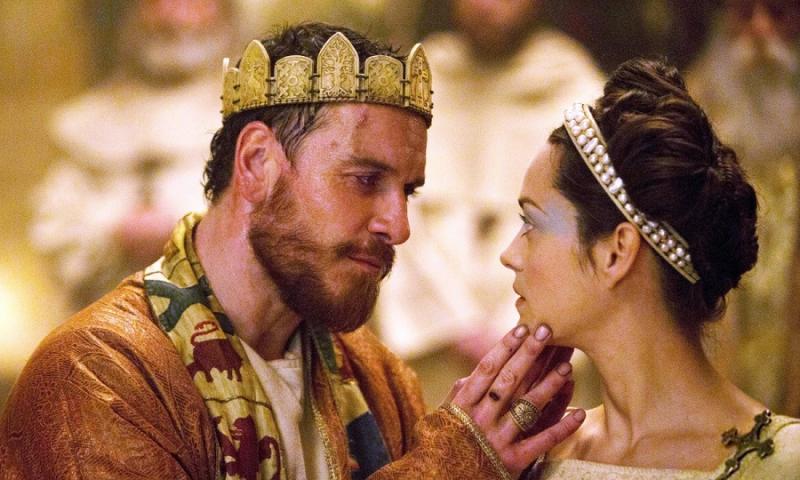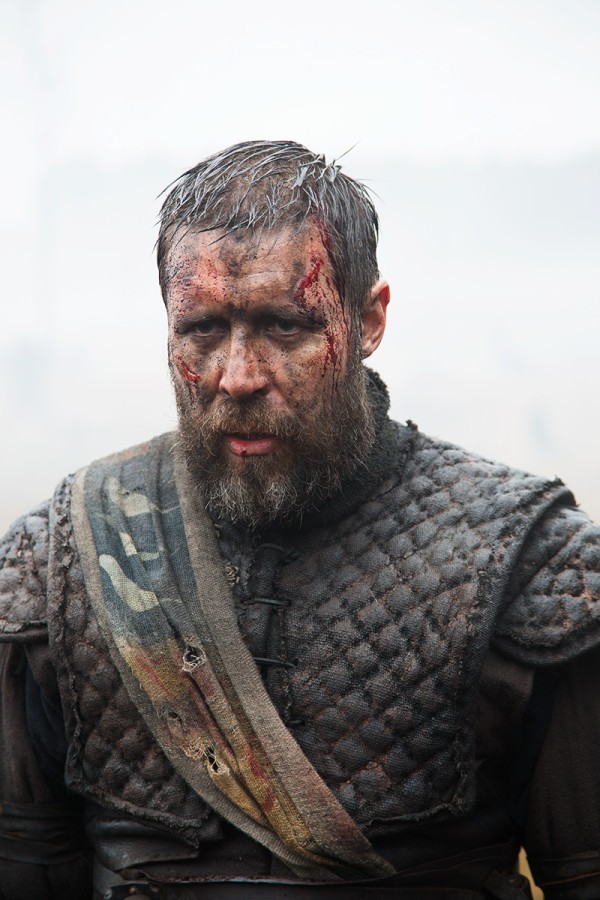Macbeth | reviews, news & interviews
Macbeth
Macbeth
The Scottish play starring Michael Fassbender and Marion Cotillard marries spectacle to mumblecore

The question of the Macbeths’ dead child is one of those Shakespearean quandaries, like Hamlet’s age, Iago’s cuckolding and Beatrice and Benedick’s earlier dalliance. How much do they really matter? In this new film version of the Scottish play, it’s all about the back story. Everything – Macbeth’s disdain for death in battle, Lady Macbeth’s descent into somnambulant madness – hinges on the loss of a child.
The solemn, wordless opening locates the Macbeths’ motivation in bereavement for a little child onto whose dead eyelids Macbeth places pebbles before the body is paganistically cremated on a blustery mountain pyre. When Lady Macbeth says she’d rather dash her baby’s brains out than defy the witches’ prophecy, this is the child she means, the child whose premature death makes it easier for Macbeth to command the murder of Banquo’s and the ghastly public incineration of Macduff’s progeny. Even the witches appear to him augmented by the presence of a child. In this dynastic saga, the Macbeths have no stake in anyone’s future but their own.
Only after impaling his wife does he have the balls to impale his king
Justin Kurzel’s own back story is all about serial killing. His much praised 2011 indie hit Snowtown peered bleakly into the mind of a young multiple murderer. Tacking across continents and centuries to early medieval Scotland, he brings with him a confident understanding of psychotic violence. And in Michael Fassbender he has a blue-eyed, muscular Macbeth whose gorgeous rictus suggests the onset of mania: he cuts and thrusts (and fucks) with the commitment of a priapic screen hero.
Fassbender's verse-speaking isn’t a match for his physical presence. The text, the dialogue as much as the soliloquys, has a whispered interiority which suggests the entire drama is an apparition taking place inside Macbeth’s head. That idea was fully achieved in Alan Cumming’s one-man Macbeth for the National Theatre of Scotland in 2012. Here Fassbender comes across as just a little too introverted. “Why do you start and seem to fear things/That do sound so fair?” asks Paddy Considine’s fine Banquo (pictured below) as the witches issue their prophecy. He must have a sharp pair of peepers because Fassbender doesn’t move a muscle. Even at the end, as he drags his wife’s body around the bedchamber, his “Tomorrow and tomorrow and tomorrow” feels dwarfed by the occasion as much as the grandiloquent architecture.
 A similar mutedness infects Marion Cotillard’s Lady Macbeth. Grieving and prayerful, she is reinvigorated by the prospect of Macbeth as monarch and stiffens his spine by stiffening his groin (only after impaling his wife does he have the balls to impale his king, played by David Thewlis). But hers is a chilly fire, and even her madness is pitiable and bathetic. Together they are beautifully watchable as copper-bottomed film stars should be. But they are not – as one critic, possibly not a theatre-goer, has breathlessly suggested – some sort of Platonic ideal in the roles after whom all potential successors may as well give up.
A similar mutedness infects Marion Cotillard’s Lady Macbeth. Grieving and prayerful, she is reinvigorated by the prospect of Macbeth as monarch and stiffens his spine by stiffening his groin (only after impaling his wife does he have the balls to impale his king, played by David Thewlis). But hers is a chilly fire, and even her madness is pitiable and bathetic. Together they are beautifully watchable as copper-bottomed film stars should be. But they are not – as one critic, possibly not a theatre-goer, has breathlessly suggested – some sort of Platonic ideal in the roles after whom all potential successors may as well give up.
This is a mumblecore Macbeth, dialled down for the big screen and, it seems, heavily post-synced. Here’s how sotto voce it all is: Sean Harris, the chief culprit in the BBC’s Jamaica Inn mumblegate saga, is one of the more voluble speakers as Macduff. The most successful manifestation of this softly-spoken Macbeth is in the witches. More fair than foul, with strange notches in their skin, they hover about the misty edges, weird figments rather than cackling hags with a boiling cauldron.
Instead the sound and the fury is supplied by the roar of armies, the clash of blades, the gush of blood and the howl of gales. It is a hell of a spectacle. DoP Adam Arkapaw can’t get enough of the Highlands: he's all wide eyes and wide angles as the mountains and glens fan out before him, smothered in clouds and drenched in rain. His camera wobbles as if buffeted by winds. Here and there he gets to drench the screen in colour, climactically in the engulfing flames for the epic, redemptive encounter between Macbeth and Macduff.
Kurzel has delivered a lean and sparse adaptation, heavily trimmed and light on psychological depth. As a cinematic spectacle it is stunning. As a study of the play, it lacks that essential Macbethian ingredient: ambition.
Overleaf: watch the trailer to Macbeth
rating
Explore topics
Share this article
Add comment
The future of Arts Journalism
You can stop theartsdesk.com closing!
We urgently need financing to survive. Our fundraising drive has thus far raised £49,000 but we need to reach £100,000 or we will be forced to close. Please contribute here: https://gofund.me/c3f6033d
And if you can forward this information to anyone who might assist, we’d be grateful.

Subscribe to theartsdesk.com
Thank you for continuing to read our work on theartsdesk.com. For unlimited access to every article in its entirety, including our archive of more than 15,000 pieces, we're asking for £5 per month or £40 per year. We feel it's a very good deal, and hope you do too.
To take a subscription now simply click here.
And if you're looking for that extra gift for a friend or family member, why not treat them to a theartsdesk.com gift subscription?
more Film
 The Mastermind review - another slim but nourishing slice of Americana from Kelly Reichardt
Josh O'Connor is perfect casting as a cocky middle-class American adrift in the 1970s
The Mastermind review - another slim but nourishing slice of Americana from Kelly Reichardt
Josh O'Connor is perfect casting as a cocky middle-class American adrift in the 1970s
 The Perfect Neighbor, Netflix review - Florida found-footage documentary is a harrowing watch
Sundance winner chronicles a death that should have been prevented
The Perfect Neighbor, Netflix review - Florida found-footage documentary is a harrowing watch
Sundance winner chronicles a death that should have been prevented
 Blu-ray: Le Quai des Brumes
Love twinkles in the gloom of Marcel Carné’s fogbound French poetic realist classic
Blu-ray: Le Quai des Brumes
Love twinkles in the gloom of Marcel Carné’s fogbound French poetic realist classic
 Frankenstein review - the Prometheus of the charnel house
Guillermo del Toro is fitfully inspired, but often lost in long-held ambitions
Frankenstein review - the Prometheus of the charnel house
Guillermo del Toro is fitfully inspired, but often lost in long-held ambitions
 London Film Festival 2025 - a Korean masterclass in black comedy and a Camus classic effectively realised
New films from Park Chan-wook, Gianfranco Rosi, François Ozon, Ildikó Enyedi and more
London Film Festival 2025 - a Korean masterclass in black comedy and a Camus classic effectively realised
New films from Park Chan-wook, Gianfranco Rosi, François Ozon, Ildikó Enyedi and more
 After the Hunt review - muddled #MeToo provocation
Julia Roberts excels despite misfiring drama
After the Hunt review - muddled #MeToo provocation
Julia Roberts excels despite misfiring drama
 Ballad of a Small Player review - Colin Farrell's all in as a gambler down on his luck
Conclave director Edward Berger swaps the Vatican for Asia's sin city
Ballad of a Small Player review - Colin Farrell's all in as a gambler down on his luck
Conclave director Edward Berger swaps the Vatican for Asia's sin city
 London Film Festival 2025 - Bradley Cooper channels John Bishop, the Boss goes to Nebraska, and a French pandemic
... not to mention Kristen Stewart's directing debut and a punchy prison drama
London Film Festival 2025 - Bradley Cooper channels John Bishop, the Boss goes to Nebraska, and a French pandemic
... not to mention Kristen Stewart's directing debut and a punchy prison drama
 London Film Festival 2025 - from paranoia in Brazil and Iran, to light relief in New York and Tuscany
'Jay Kelly' disappoints, 'It Was Just an Accident' doesn't
London Film Festival 2025 - from paranoia in Brazil and Iran, to light relief in New York and Tuscany
'Jay Kelly' disappoints, 'It Was Just an Accident' doesn't
 Iron Ladies review - working-class heroines of the Miners' Strike
Documentary salutes the staunch women who fought Thatcher's pit closures
Iron Ladies review - working-class heroines of the Miners' Strike
Documentary salutes the staunch women who fought Thatcher's pit closures
 Blu-ray: The Man in the White Suit
Ealing Studios' prescient black comedy, as sharp as ever
Blu-ray: The Man in the White Suit
Ealing Studios' prescient black comedy, as sharp as ever
 The Woman in Cabin 10 review - Scandi noir meets Agatha Christie on a superyacht
Reason goes overboard on a seagoing mystery thriller
The Woman in Cabin 10 review - Scandi noir meets Agatha Christie on a superyacht
Reason goes overboard on a seagoing mystery thriller

Comments
Very good, I've been sort of